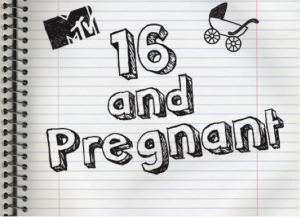16 and not pregnant: yes, media messages can actually benefit women
If you were a teenage girl addicted to television programmes examining teen pregnancy and parenthood would you:
a) Go out and get pregnant because it’s so cool and you’ll get on TV!
Or, b) reflect on your sexual practices.
Well, according to research into the impacts of MTV’s 16 and Pregnant and Teen Mom, you’d be more likely to choose option B.
MTV’s reality programming has copped a lot of flak over the years for its proposed detrimental effects on the morality (and etc.) of young people. However, the Media Influences on Social Outcomes: The Impact of MTV’s 16 and Pregnant on Teen Childbearing study found a correlation between high ratings of the network’s teen parenthood programs and reduced teen pregnancy rates. To be exact: a 5.7% decline or 20,000 fewer births to teens in 18 months following 16 and Pregnant’s premiere.
To be optimistic: that’s just 18 months in ’Murica!
Taking into consideration the hit and miss nature of American sex education, this is promising. Sex education in the USA has had mixed results due to abstinence-only education being funded by the government for more than 20 years. Comprehensive courses are available in high schools on more realistic means of contraception and STI prevention, but abstinence-only education is still prevalent and still occasionally funded by Capitol Hill. Consider the satire presented in the Mean Girls Sex Ed teacher’s maxim: ‘don’t have sex because you will get pregnant and die’.
Steps are being taken to remove abstinence-only education completely, but its damage is still apparent. When you take into account that longitudinal health studies of teen mothers have found ‘chastity pledges’ to correlate with almost 1% of pregnancies being proclaimed as ‘immaculate’, you know things aren’t great. Compounded with unabolished taboos of talking about the nitty gritty of sexual health – in the classroom or at home – there are ongoing effects of misinformation even where there is discussion of contraception and STI prevention.
This is where MTV has stepped in.
I’m not going to put you through too much communication theory discussion because frankly, that’s what my uni tutors want me to do. That and there’s so many theories your head will explode like mine did in the first semester of my degree… Luckily I was able to piece it all back together. What I will say is: media messages can be hit and miss all in one because people interpret the meaning of codes differently regardless of how they have been shaped because of peoples’ cultural and individual contexts.
Critics of 16 and Pregnant and Teen Mom argued that the educational message MTV may have intended would be lost on the young audience. Critics further argued that fame hungry young women may want to get pregnant to become a part of these shows, which can’t be entirely disproven. But this – the dominant decoding critics anticipated – is of course not the case.
The visual, serial nature of 16 and Pregnant and Teen Mom is undoubtedly a part of the success of these two MTV programs. As Marshall McLuhan proclaimed: the medium is the message. It’s a statement describing how a media message is shaped by its platform and the characteristics of this platform’s message means it is interpreted differently to other mediums.
Young people are increasingly glued to screens and visual stimuli. Conceivably, lectures on condoms and pills and diaphragms (oh my!) can only go so far. As can those huge pregnancy belly prostheses and screaming, computerised Chucky Dolls one may encounter in parenting and child studies courses. The narrative of reality television embeds itself under peoples’ skin in a way other communication tools can’t and MTV has really honed in on this.
While the study didn’t find MTV to be the causal link in teen pregnancies – i.e. that the decline in teen pregnancies were not a direct result of the television programme – data from Twitter shows it got teens thinking about contraception. In this way, its influence is a promising find not just because it has caused one batch of young women to think about their health, but also because it reveals the influence communication and media may have to better inform women’s choices.



Pingback: Feminist News Round-Up 26.01.13 | lip magazine